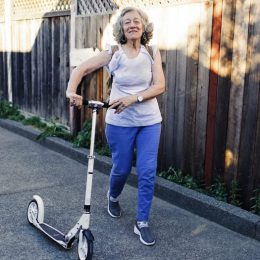They Can Sniff Out Cancer and 7 Other Surprising Reasons to Own a Dog
Sure, a puppy will put a smile on your face, but he may also help you live healthier and longer. Good boy.

What’s small, furry, and good for your health?
Yes, a peach. But also a pooch. Dogs add so much joy to life that it’s not hard to imagine that owning one can have a positive impact on your well-being—especially as you get older.
But the benefits of dog ownership go beyond putting a smile on your face. Here are eight convincing reasons to go ahead and adopt that pup. You could even say it’s doctor’s orders.
1. They Keep You Moving
Adults ages 65 and older should get 150 minutes of moderate physical activity per week, or 22 minutes each day, according to the Centers for Disease Control and Prevention. Regularly walking your dog makes hitting that goal a cinch.
A new study published in BMC Public Health found that 65-and-older dog owners tend to walk precisely 22 minutes more each day than nonowners, netting them an extra 2,700 steps. This helped 87 percent of dog owners reach their daily goal of 10,000 steps (at a moderate pace, to boot!) compared to just 47 percent of nonowners.
“This is important, not only because meeting the physical activity guidelines is associated with better health, but it also has implications for keeping you mobile and being able to live independently,” says study author Philippa Dall, Ph.D., senior research fellow at Glasgow Caledonian University in Scotland.
2. They’re Good for Your Heart
Dog ownership is good for your blood pressure. Research shows that people who own dogs have lower levels of resting blood pressure and are less likely to have hypertension.
What’s more, an Australian study found that older adults with high blood pressure who own pets are 26 percent less likely to die from heart disease than nonowners.
The American Heart Association supports pet ownership, and particularly dog ownership, as a reasonable way to reduce the risk of heart disease, although the organization doesn’t recommend that you get a dog for the sole purpose of cutting your risk.
3. You’ll Feel a Greater Sense of Belonging
If you stop and chat with your neighbors when you’re walking your dog, you’re gleaning one of the social benefits of dog ownership: feeling connected to your community. A recent study in Health and Place found that adults over 50 who regularly walk their dogs are about twice as likely to have positive feelings about their communities compared to nonowners and dog owners who don’t walk their dogs.
Regular doses of social interaction with neighbors can be especially meaningful for older adults whose social circles have grown smaller over the decades.
“It appears that dog walking may help to facilitate physical, emotional, and social benefits, which may also help to support health and well-being,” says study author Ann M. Toohey, Ph.D., scientific coordinator of the Brenda Strafford Centre on Aging at the University of Calgary Cumming School of Medicine. “Remaining both physically mobile and socially engaged within community settings are viewed as factors that can enable older adults to age in place,” she says.
4. They’re Instant Stress Relievers
We know our pets can make us happier, but research shows that interacting with dogs can help reduce stress. Even something as simple as playing fetch or petting your pup can increase levels of the feel-good hormone oxytocin in your brain, and lower production of cortisol, a stress-inducing hormone.
A furry friend might even be better than a human companion when it comes to easing tension. One study found that people’s blood pressure levels were lowest when they spent time with their pets, compared to being alone with their spouse, likely because they feel calmed by the animal’s presence.
5. They Can Sniff Out Cancer
Dogs are known for their keen sense of smell, and working dogs that locate bombs, drugs, or disaster victims are the most famous examples of this sniffing power. Turns out, they may also be able to sense what’s going on inside our bodies.
Research has found that everyday, average household pooches can be trained to distinguish the differences in the breath of those with lung and breast cancer to those without. Another study found that dogs could be trained to detect biomarkers in the urine of those with prostate cancer.
And it’s not just cancer. Dogs can also detect blood sugar emergencies in people with diabetes and may be able to sniff early signs of Parkinson’s.
Biodetection and medical assistance canines require unique training, and much of the research in this area is still in early stages. So, while it may not be feasible to obtain one of these special dogs, if your pup is paying extra attention to an area of your body and showing signs of distress, examine it. Did you drop food on yourself, do you smell like another animal—or does your body feel or look different?
Want more ways to get in tune with your body? Check out these self-checks that can give you clues about your health.
6. They Ease Social Isolation
Dogs can fulfill your social needs. Older women who are emotionally attached to their pets are less likely to feel lonely or depressed, says research in Geriatric Nursing. This may be significant if you live alone and don’t interact with people often.
Subscribe to our newsletter
It's quick and easy. You could be one of the 13 million people who are eligible.
Already a member? Click to discover our 15,000+ participating locations.
Follow Us
“Dogs are loyal pets, companions, and family,” says David O. Garcia, Ph.D., assistant professor of health promotion sciences at the University of Arizona. “When the relationship is one-on-one, more time is devoted to caring for the pet and vice versa. I believe if an older adult living alone has an opportunity to have companionship and support from any pet, they are benefiting.”
7. They May Help You Quit Smoking
If you’re still lighting up but trying to quit, a new pup may be just what you need. In one study, 28 percent of smokers who owned pets reported that knowledge of the harmful effects of secondhand smoke on their pets would motivate them to quit.
Need a little more motivation? Check out our guide to eight smoking myths you may still believe.
8. They Give You a Purpose
Owning a dog helps fight depression, especially in older adults, because they provide you with a meaningful purpose: You have someone to take care of, to comfort you, and to share physical affection with. Caring for your dog can even inspire you to take better care of yourself.
“Having a reason to go out, even if you don’t feel like it—for example, if the weather is bad, you feel a little unwell, or you just don’t feel motivated—can be really helpful,” Dall says.
Ready to Take the Next Step?
To help you find your perfect pooch, we’ve collected key stats on seven breeds the American Kennel Club recommends as top companions for older adults. They’re not too big, don’t require excessive exercise, and have friendly temperaments. Click here to find the best breed for you.
And if dog ownership isn’t right for you—you would have physical or financial difficulty caring for a pet, for example—look for other ways to get some quality canine time. Spend time with a friend who has a dog, get a part-time job as a dog walker, or consider volunteering at your local animal shelter.
Take Your Favorite SilverSneakers Classes Online!
SilverSneakers members can access live fitness classes and wellness workshops through SilverSneakers LIVE. See the latest schedule and RSVP for classes here.
Not a member? If you have a Medicare Plan, it may include SilverSneakers—at no additional cost. Check your eligibility instantly here.





